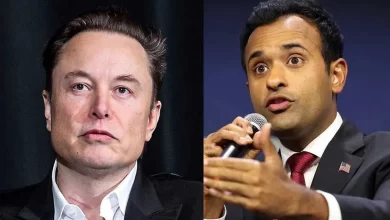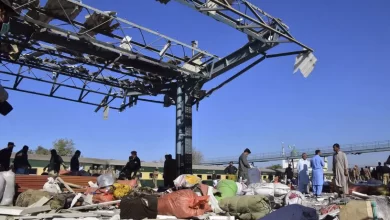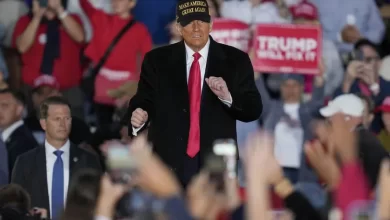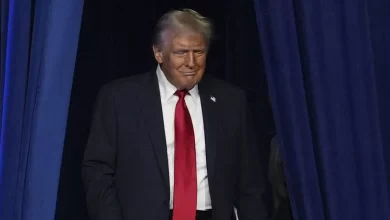US, UK, Russia, China to France, countries flag use of drones, cryptocurrency

The threat posed by drones, terror funding through cryptocurrency and the use of internet by terrorist outfits were among the key concerns raised Saturday at the UN Security Council’s Counter-Terrorism Committee meeting in New Delhi.
Government representatives and experts from multiple countries expressed their views on the use of emerging technologies by terrorists.
At the end of the two-day meeting, the Delhi Declaration of the CTC took note of the threats and called on members to take measures to counter them.
The declaration expressed “deep concern that terrorism… has become more diffuse… aided by terrorists’ adaptation to, and the use of new and emerging technologies… while recognizing that innovations in technology may offer significant counter-terrorism opportunities.”
It noted with “additional concern, the increasing global misuse of unmanned aerial systems (UAS) by terrorists to conduct attacks against, and incursions into critical infrastructure and soft targets or public places, and to traffic drugs and arms”.
Expressing concern over the access that groups such as the Islamic State and Al Qaeda have to drones, the declaration called on member states “to develop a comprehensive understanding of the risks posed by terrorist use of UAS and of specific terrorist groups’ systems for acquiring UAS and their components”.
It also asked members to develop measures to deter, detect and disrupt the acquisition and use of drones by terrorists, and engage in partnerships with the private sector to this end.
Representatives from countries such as China, Russia and France argued for a united approach against the drone threat and demanded a regulatory framework that could be adopted by member states.
“UAS remains attractive for malicious actors as they are relatively accessible, affordable, and require minimal training… A whole of society approach is needed to counter terrorist exploitation of UAS,” said Madan Oberoi, Executive Director for Technology and Innovation with the Interpol.
Oberoi said an Interpol report had highlighted drones as an asymmetric threat to law enforcement and that agencies and industry need to work together to counter them.
“The report said the drone appears to be an asymmetric threat for law enforcement agencies. It also recommended a unified drone threat reporting system, further law enforcement engagement with industry and strong need for legislation and regulation to protect the restricted airspace of national interest,” he said.
The US said in the past one year there had been an uptick in attacks involving the weaponized aerial systems globally. “Terrorists and other non-state actors have used UAS to attack critical infrastructure and military and diplomatic facilities. We should continue sharing best practices building on existing efforts such as GCTFS Berlin memorandum on good practices to counter terrorist use of UAS,” the US representative said.
UAE said the global community needed to set up a mechanism to prevent procurement of UAS components by terrorist groups, systems for deterrence, tracking and neutralization of drones and prosecution of perpetrators.
China too flagged the challenges of UAVs and the use of internet by terrorist groups. “We should build a closed network in cyberspace and pay attention to UAS technology and enforce regulatory monitoring and strengthen defense systems,” the Chinese representative said.
Taeil Kang, Capacity Building Director of World Customs Organisation, said they were in the process of developing AI-enabled X-rays to curb illegal import and export of drones.
Justin Hustwitt, Coordinator with the UN’s Analytical Support and Sanctions Monitoring Team, recounted how IS and Al Qaeda were increasingly using drones to mount attacks across the world and that there were reports of them developing larger drones to mount long distance attacks.
“The challenge in countering drones is the lack of harmonised regulatory jurisdictions. An international regulatory framework is required,” Hustwitt said.
On the threat from cryptocurrencies, the Delhi Declarartion called on member states to “consider and assess risks associated with… prepaid cards, virtual assets and… crowdfunding platforms, and implement risk-based anti-money-laundering (AML) and counter-terrorist financing (CFT) regulations, monitoring, and supervision to providers of relevant services”.
The declaration acknowledged the “essential” role of the Financial Action Task Force (FATF) in this regard. It asked member states to enhance the traceability and transparency of financial transactions.
FATF Vice President Elisa de Anda Madrazo rued the lack of legislation on cryptocurrencies in many countries and called for urgent action.
“We issued our first report on the risk over a decade ago and we also issued what is the first set of standards for visual assets three years ago in 2019. The implementation is going far too slow. Only 60 countries have started to regulate this sector and to try to supervise it. The rest of the world doesn’t have regulation and most of them have not even started a legislative process. This is very concerning because while standards take time to be implemented, there is a sense of urgency here and until most jurisdictions implement these new rules, it will not be possible to start implementing the travel rule (account of a transaction),” she said.
Russia too raised a red flag over cryptocurrencies.
“Terrorists are diversifying their funding patters. The so-called crowdfunding platforms seem to be very popular among terror groups. The very active use by terrorist groups of crypto exchanges is a big challenge. There is still no control over cryptocurrency even as terrorists continue to use them at a time they (virtual currency) have achieved wider popularity. This is benefitting terrorist groups who are highly adaptive to constantly changing conditions and are quickly learning how to perform their transactions online,” the Russian representative said.
The UK said it was taking an international approach to tackle the problem of terrorist use of internet and social media.
“We work in collaboration with our international partners and technology companies to ensure there are no safe spaces for terrorists to operate online. We are ensuring that law enforcement can combat terrorist financing such as crypto assets and we funding the development of counter drone technologies,” the UK representative said.
The Delhi Declarartion noted “with concern the increased use, in a globalized society, by terrorists and their supporters of Internet… for recruitment and incitement to commit terrorist acts, as well as for the financing, planning, and preparation of their activities”.
The UAE said the efforts to remove terror content from the internet was challenge as world had no consensus on definition of terrorism.
“Terrorists have harnessed the internet to pursue radicalization, incitement to violence and recruitment. Efforts to moderate and remove such content has been challenging. One reason being the absence of international agreement on what constitutes terrorism. Nevertheless we could combat such content with a strong, fact-based, effectively deployed counter narrative that promotes tolerance, social cohesion, and peaceful co-existence. Stengthening cooperation between different sections of society is crucial for these efforts,” the UAE representative said.
The Delhi declaration emphasised the need for member states “to continue voluntary cooperation with the private sector and civil society, to develop and implement more effective means to counter the use of new and emerging technologies, including the Internet, for terrorist purposes”.
Russia said that according to its data, 90 per cent of terrorist attacks globally were performed by deploying cutting edge emerging communication technologies.
“Recruitment is 80 per cent relying on online technologies and we see more cases where terrorist attacks are being demonstrated publicly as well as online. Considering use of technology to support terrorist violent purposes, governments quite often underperform. We must curb the deployment of internet technologies by terrorists,” the Russian representative said.







